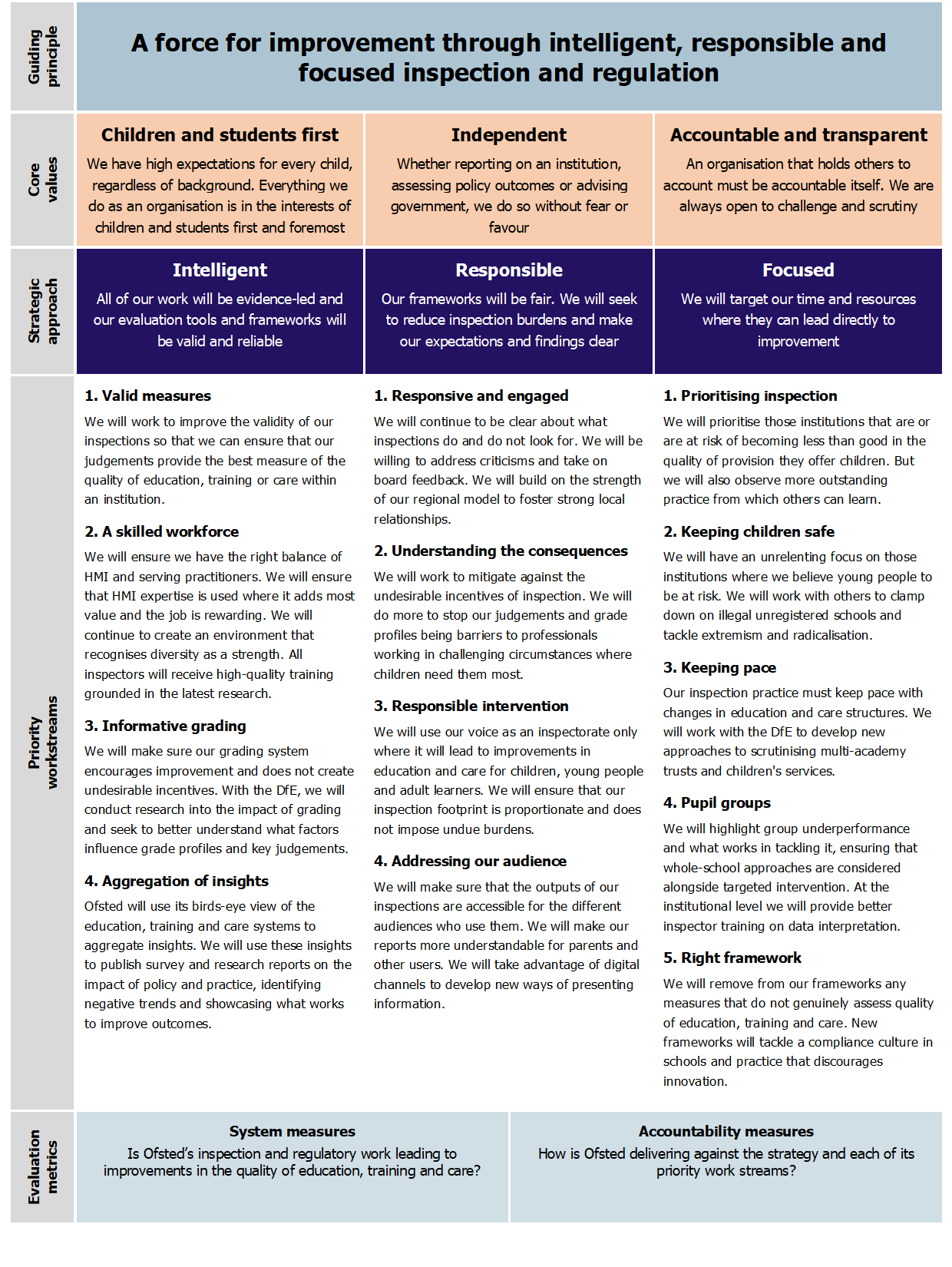Ofsted’s new strategy: Where are they going next?
29th September 2017
Over the last 6 months Anna and I have had the privilege of participating in a series of meetings exploring Ofsted’s future direction. It’s therefore very exciting to see the finished product of a major strategy review launched today.
In this blog I want to highlight 10 key extracts.
- “We must ensure that our grading system encourages improvement and does not create undesirable incentives. We will work with the Department for Education to conduct research into the impact of the inspection grading structure”
There has been increasing talk in recent years of cutting Ofsted’s grading system to a ‘pass/fail’ statement. I was initially opposed to this as I think the outstanding grade can/could incentivise excellence. However I’ve gradually started to think that chasing the top label actually does more harm than good. It’s also hard to be confident it’s a reliable or valid label in the first place.
On the other hand, different responses may be needed for different sub-threshold schools. Whilst some require ‘special measures’ others might need something softer and more gradual.
All in all it therefore seems a good idea that Ofsted is leaving the door open to rethinking a grading system that underpins so much in the sector.
- “Act as a counterbalance to any unintended incentives in the broader accountability system.”
 I’ve always thought of Ofsted as a necessary counterbalance on the accountability scales. Whilst exam based accountability holds schools to account for one dimension of what we want from schools, if things are too weighted that way, other things might quickly be lost – and arguably have been.
I’ve always thought of Ofsted as a necessary counterbalance on the accountability scales. Whilst exam based accountability holds schools to account for one dimension of what we want from schools, if things are too weighted that way, other things might quickly be lost – and arguably have been.
As our “Learning Away” report published today shows there’s more to educational inequality than an attainment gap. The report looks at the availability, quality and equity of school residentials and finds that access to enriching opportunities is severely limited by pupil poverty.
It’s therefore great to see Ofsted recognise that it is not there to replicate the rest of the accountability system, but to counterbalance it.
- “Inspection is by its nature ‘an art done scientifically’.”
I like this phrase.
- “We will create better avenues for Ofsted to absorb expertise from think tanks, academics and other stakeholders.”
Unsurprisingly, this sounds exciting to me. Ofsted have a huge amount of data. Teams like ours could potentially do a huge amount more work understanding trends or spring-boarding from the findings to more detailed follow up research exploring what is happening on the ground.
- “It is undoubtedly the case that what Ofsted has said and done has shaped the sectors we inspect. This has not always been for the good.”
Nice humility and honesty.
- “We should ensure that our judgements and grade profiles are fair and not barriers that deter talented professionals from working in areas where young people are most in need of support.”
Some schools are known as ‘don’t touch /pariahs’ and this isn’t in anyone’s interest. I can’t imagine how scary it would be as a school leader to take a high risk school on. It’s a risk that can scupper careers. I’m glad that Ofsted recognises the need to somewhat de-risk these roles. On the other hand, it’s not easy to see how this can be done given point 7…
- “While it must be the case that new providers are given a chance to improve when they take over a previously underperforming institution, we must not allow providers to evade any form of scrutiny for long periods of time as this poses a risk to young people’s education”
Combining 6 and 7 will be a difficult balancing act.
- “The existence of a gap does not always indicate that an intervention at sub-group level is the right approach. Very often, identifying and correcting institutional shortcomings (for example in curriculum, teaching or behaviour management) will, as evidence from organisations such as the Education Endowment Foundation (EEF) shows, improve outcomes, with disproportionate benefits for lower attaining and disadvantaged students. In some cases, improving whole institution provision will be necessary but not sufficient. In such cases, more targeted approaches to supporting disadvantaged groups and individuals will be required.”
This is an important recognition that some of the pressure to ‘close gaps’ is resulting in intervention overload and a distraction from ensuring overall quality. There’s no point investing masses in interventions to patch over mediocre provision if it distracts from resolving the mediocrity.
On the other hand, the final part of the paragraph is key too: our research has time and again shown that pupils with identified special needs requiring specific provision often miss out on the support they need.
- “In developing our 2019 education common inspection framework, we will avoid focusing on those areas that do not provide a measure of quality of education and look to report separately on areas which could skew overall judgements…In the longer term, we will explore whether it is possible to separate the compliance aspects of our framework from those that focus on quality of education and care.”
I’m not clear what’s being referred to here. If it’s about safeguarding then I’m not wholly convinced that is entirely separate to the quality of education…
One for clarification!
- “In measuring rates of improvement in education and care, we will use published data from the Department for Education, alongside our own state of the nation inspection data, to look at inputs, outputs and outcomes. We will explore the feasibility of combining these measures to create a composite indicator of improvement across each of the sectors we inspect.”
This could be very geekily interesting – I’m looking forward to the debate on how best to do this!
One particular benefit could be that such indicators encourage people to look beyond schools and towards the other areas that fall under Ofsted’s remit.
All in all it’s an exciting time for Ofsted and the changes we will see in the next few years (and which have already begun) could be game-changers for schools. Watch this space!


Comments